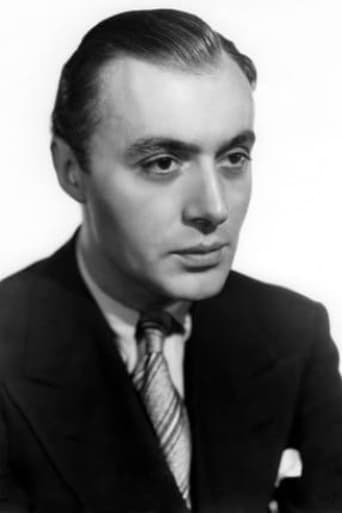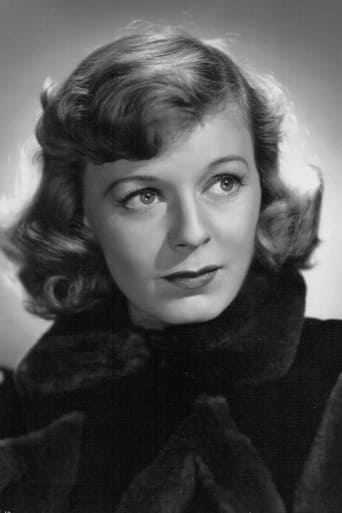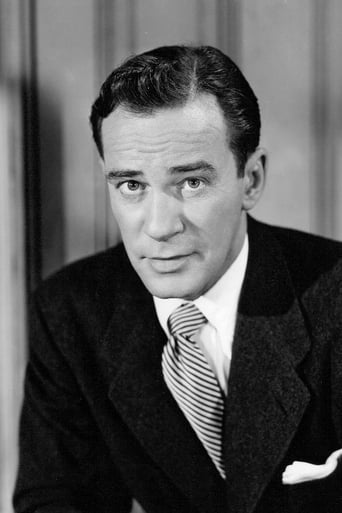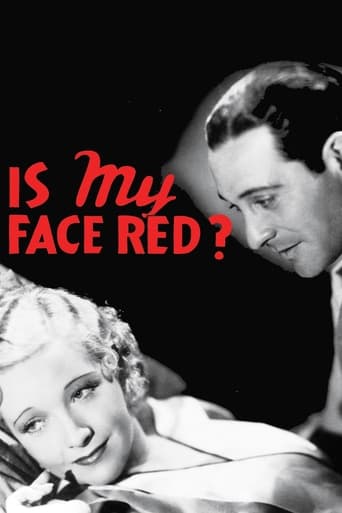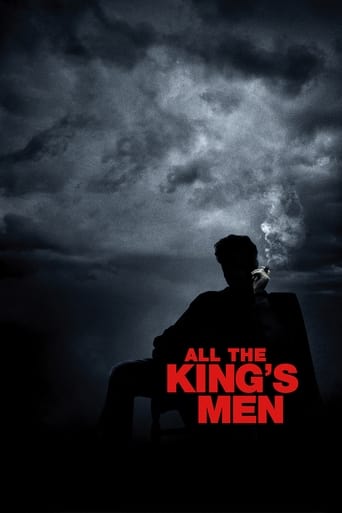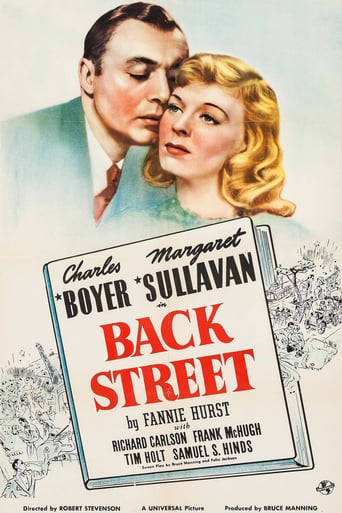
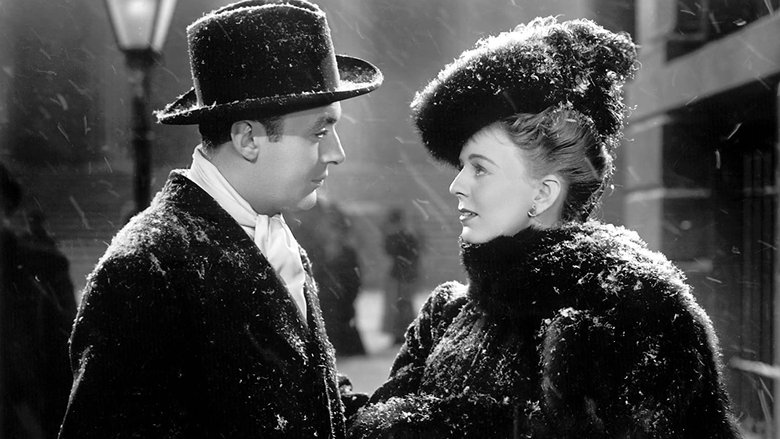
Back Street (1941)
Previously filmed in 1932, and remade a third time in 1961, this second film version of Fannie Hurst's novel stars Margaret Sullavan as a fashion designer in love with a married banker (Charles Boyer). Directed by Robert Stevenson, the film also stars Richard Carlson, Tim Holt, Frank McHugh, Esther Dale and Cecil Cunningham.
Watch Trailer
Cast
Similar titles


Reviews
Terrible acting, screenplay and direction.
Great Film overall
Excellent, Without a doubt!!
A Major Disappointment
Somewhere there must still be feminists cringing at the memory of this movie, and with good reason. It tells the story of an independent young woman, Ray Smith, played by Margaret Sullivan, who falls in love with, and is loved by, a visiting banker, Charles Boyer. Boyer wants to marry her but there is a misunderstanding - he thinks she has dropped him for another man - and he leaves town without Smith and marries the boss's daughter back in New York instead. Five years later Smith and Boyer's character meet again. He is still married, though evidently it is a loveless marriage. S and B start to see each other again. She realizes that she will never be the sole center of his attention, that she will always be a "back street woman," but even when she has a chance for marriage with another man, she remains with Boyer as his hidden mistress, for 25 years.No, a woman's only happiness is not necessarily marriage and children. But this movie doesn't really - would not have dared, in 1941 - show that Smith has a happy, fulfilling life as a married man's other woman. So we are left with a strange feeling. Yes, Sullivan's character loves Boyer's and feels that she is loved by him, but she can never acknowledge that publicly. She spends 25 years in the shadows, and we never really have the sense that she is happy doing so, except perhaps at the end.Of course, any feminist would say, and quite rightly so, that Smith should have gone for something more fulfilling.So I am left to wonder 1) who was the intended audience for this picture?, and 2) how were they expected to react to the heroine's choices? A frustrating movie.
Margaret Sullavan is one of my all-time favorite actresses with her husky voice and haunting screen presence. The original version in 1932 with Irene Dunne and John Boles was dull and stage-bound; the later version with Susan Hayward was just too gaudy. This is the version to watch! Margaret gives an exquisitely heart-rending performance as a turn-of-the-century miss who falls in love with a man (played by the smooth but oh-so-serious Charles Boyer). Fate intervenes and the two lovers are separated. They meet again years later, but, true to the classic weeper formula, he is married. Despite her better judgment, she carries on a "Back Street" romance with him for many years until their untimely demises.Promoted with the tag line, "If you have tears, be prepared to shed them", this movie does involve some suspension of disbelief. For example, for such a level-headed gal, why does Margaret allow Boyer to treat her so shabbily? Just when I am about to shake my head and yell "Why?", Margaret then either let loose with the tears or try to hide the choking sob in her voice, and I'm transfixed all over again.This film does feature solid direction, beautiful photography and some good supporting performances (I particularly liked Frank McHugh in this one). This film remains on my "Wish-They-Release-This-One-on-Video" list.
I'm the rotten apple in the bunch. Everyone loved this version and blasted the 1961 super sudser. My comments will be brief. I just detested both of the main characters. Boyer's Saxel was a pompous boor at best and a downright t**d at worst. "Well, it's not as if I had a choice about taking this job!" paraphrase he exclaims haughtily when poor, poor Rae complains about his trip abroad. (Guess not...his father-in-law might have cut off his other... well, you know...and put it in his *other* jacket pocket) It was at about this point in the movie that someone needed to start slapping Rae about every 30 seconds or so. Someone called the Hayward version "unbelievable". That 1941-Rae would dump the oh so cute and sweet Curt in favor of that French aristocratic ass is the *height* of disbelief in my opinion. I mean, for crying out loud, Saxel not only left her for an indeterminate period of time but also took his wife with him, didn't tell Rae he was back for a week when he finally did come home and managed to pop off a baby girl Saxel with the little woman while on the boat. "You know how crazy everything gets when a new Saxel is born," <paraphrase> he tells her to excuse his tardiness (with an grudging "a"). Frankly, given his degree of romantic appeal, I'd have questioned paternity. Plot-wise, nobody is that stupid. But, Crazy Rae *still* leaves poor old Curt in the lurch to stand by her t**d. Now *that's* unbelievable. At least the Hayward character had the sense to get a job. In the 1961 version events were related pretty much as they happened...in this version, we are *finally* given an explanation of Rae's foolish devotion to Saxel (ah! now it all makes sense...well, no it doesn't) in so short a time that had I gotten up to yawn I'd have missed it. Saxel's lack of personality and superior attitude never was explained...chalk it up to a bad childhood in France. When the inevitable happened, I could only hope for lightning to hit the other end of the line. Well, I could go on but I won't. If ever a movie needed soaping, sudsing and completely dry cleaned it was this one and the 1961 Hayward/Gavin versions contained just the right brand of detergent. Put it on a hanger, slap it on the rack and tag it with a "00". I confess, in retaliation and outrage I voted the 1961 version a 10.
God, this film is the queen of tearjerkers ! I have watched it countless numbers of times, and I always hope that the end will change, that brass band music playing while the steamboat wends its way down the river, with Margaret Sullavan not having been able to reach the jetty in time to catch it together with Charles Boyer, is just too much for me ! Although the story appears unbelievable, that's exactly what makes its charm ! Nowadays, the cinema is too crude and holier-than-thou to be able to make such a beautiful love story as this. Political correctness has won the battle over true feelings and emotions and has destroyed them !The theme music to this film is lovely and sad, tears are guaranteed, that is, of course, if you manage to find it on CD ( which you cannot ! ) Apparently there are other versions of this story but I would not even consider to watch them as this version with Charles Boyer and Margaret Sullivan is so beautiful and full of finesse.This film will bring tears to your eyes, even if you don't agree with infidelity. The acting is excellent and one cannot help but be moved by the lady who is desperately seeking happiness with the man she should have married but was prevented from doing so by a cruel twist of fate.
